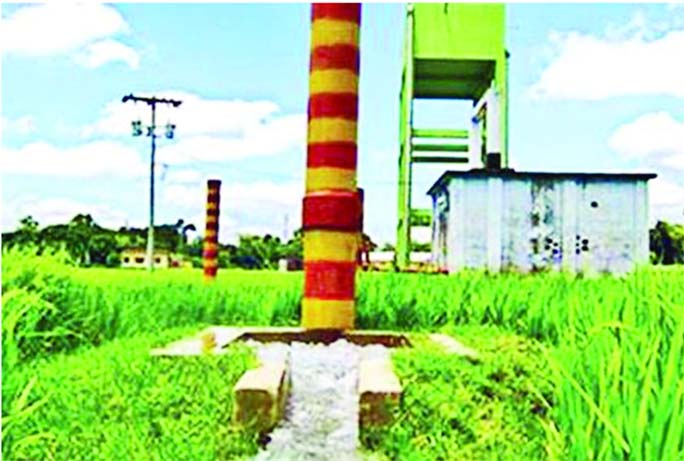
BSS, Rajshahi :
More than 13.5 lakh villagers have, so far, been brought under pipeline-based water supply coverage through 1,579 deep tube-wells in the Barind region.
With this breakthrough, the villagers located in the drought-prone areas are getting arsenic-free safe drinking water from 3.1 lakh household connections through 78,950 tap-points round the year directly at present.
Barind Multipurpose Development Authority (BMDA) has implemented a project titled “Drinking Piped Water Supply from Irrigation Deep Tube-wells” in 25 upazilas of Rajshahi, Naogaon and Chapainawabganj districts.
Some 1,579 water supply installations including equal number of overhead tanks, 4,190-kilometer distribution line and other necessary systems were constructed at a total cost of around Taka 242.87 crore in four consecutive phases of the project since last 1995, said Nazirul Islam, Executive Engineer of BMDA.
He told BSS that the initiative was taken to reduce the acute crisis of drinking water in the drought-prone Barind area, especially during the dry season.
In addition to extension of the water supply installations he said necessary chemicals and equipment of water testing laboratory were arranged to make the water free from arsenic contamination and other harmful chemicals.
The main objective of the scheme was to supply round-the-year potable water to every people in the targeted area.
BMDA Executive Director Engineer Abdur Rashid said there is a shortage of drinking water in the vast Barind tract during the dry season and the problem has become acute for the last couple of years.
The existing shallow water technologies have become ineffective currently and demand for deep tube wells has increased in the area due to rapid declining of groundwater table along with arsenic contamination in shallow aquifer in some areas of the country.
But, he said, cost of the deep tube-well is very high and especiallyunaffordable for the poor community. In this situation, our public health is in a threatened condition due to lack of proper sanitation facilities and inadequate hygiene practice.
Apart from this, the farmers are gradually becoming vulnerable due to excessive use of groundwater through irrigation and the existing adverse impact of climate change depletes groundwater table, which makes the hand- driven tube-wells inoperative and the area experiences a drinking water shortage.
So, initiative has been contributing a lot towards maintaining round-the-year drinking water supply to the remote villages, where, the nearby irrigation deep tube-wells are functioning.
Like the urban people, he said the supply system has become more dependable and helps eradicating diseases caused due to lack of safe drinking water.
Prof Redwanur Rahman of Institute of Environmental Sciences in Rajshahi University said the villagers cannot extract underground water through tube-wells due to abnormal lowering of underground water during dry season.
Apart from this, the changed climatic condition has been posing a serious threat to the overall public health in the vast Barind tract.
“The fight against water scarcity and unhygienic situation is very tough.Coordinated efforts of different government and non-government organisations are essential to stem the crises,” he added.
More than 13.5 lakh villagers have, so far, been brought under pipeline-based water supply coverage through 1,579 deep tube-wells in the Barind region.
With this breakthrough, the villagers located in the drought-prone areas are getting arsenic-free safe drinking water from 3.1 lakh household connections through 78,950 tap-points round the year directly at present.
Barind Multipurpose Development Authority (BMDA) has implemented a project titled “Drinking Piped Water Supply from Irrigation Deep Tube-wells” in 25 upazilas of Rajshahi, Naogaon and Chapainawabganj districts.
Some 1,579 water supply installations including equal number of overhead tanks, 4,190-kilometer distribution line and other necessary systems were constructed at a total cost of around Taka 242.87 crore in four consecutive phases of the project since last 1995, said Nazirul Islam, Executive Engineer of BMDA.
He told BSS that the initiative was taken to reduce the acute crisis of drinking water in the drought-prone Barind area, especially during the dry season.
In addition to extension of the water supply installations he said necessary chemicals and equipment of water testing laboratory were arranged to make the water free from arsenic contamination and other harmful chemicals.
The main objective of the scheme was to supply round-the-year potable water to every people in the targeted area.
BMDA Executive Director Engineer Abdur Rashid said there is a shortage of drinking water in the vast Barind tract during the dry season and the problem has become acute for the last couple of years.
The existing shallow water technologies have become ineffective currently and demand for deep tube wells has increased in the area due to rapid declining of groundwater table along with arsenic contamination in shallow aquifer in some areas of the country.
But, he said, cost of the deep tube-well is very high and especiallyunaffordable for the poor community. In this situation, our public health is in a threatened condition due to lack of proper sanitation facilities and inadequate hygiene practice.
Apart from this, the farmers are gradually becoming vulnerable due to excessive use of groundwater through irrigation and the existing adverse impact of climate change depletes groundwater table, which makes the hand- driven tube-wells inoperative and the area experiences a drinking water shortage.
So, initiative has been contributing a lot towards maintaining round-the-year drinking water supply to the remote villages, where, the nearby irrigation deep tube-wells are functioning.
Like the urban people, he said the supply system has become more dependable and helps eradicating diseases caused due to lack of safe drinking water.
Prof Redwanur Rahman of Institute of Environmental Sciences in Rajshahi University said the villagers cannot extract underground water through tube-wells due to abnormal lowering of underground water during dry season.
Apart from this, the changed climatic condition has been posing a serious threat to the overall public health in the vast Barind tract.
“The fight against water scarcity and unhygienic situation is very tough.Coordinated efforts of different government and non-government organisations are essential to stem the crises,” he added.

